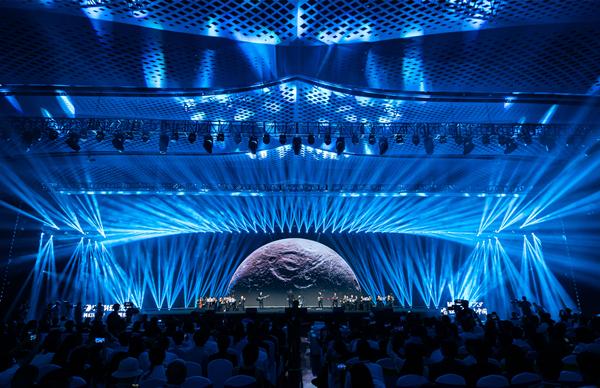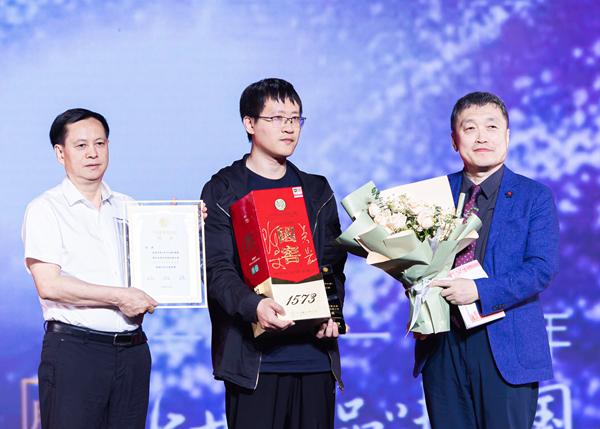
 0 Comment(s)
0 Comment(s) Print
Print E-mail China.org.cn, May 20, 2024
E-mail China.org.cn, May 20, 2024
The 15th Chinese Nebula Awards opened with a dazzling display, featuring a dynamic music band synchronized with splendid sci-fi video clips and images on a massive LED screen. The event, held in Chengdu, was a visual and auditory spectacle.

The dazzling opening of the 15th Chinese Nebula Awards gala in Chengdu, Sichuan province, May 18, 2024. [Photo courtesy of EV/SFM]
Organizers celebrated this milestone by honoring prominent young sci-fi writers and rising stars for their exceptional work. Additionally, they announced new projects, including the development of a high-end Three-Body liquor, aiming to sustain the momentum of the booming Chinese sci-fi industry.
Liu Yang, a Ph.D. in physics, won the gold award for best sci-fi novel for his work, "City in the Well," which tells a story about two-dimensional creatures plotting against humanity.
Dong Renwei, China's sci-fi mogul and co-founder of the award, noted that in 2018, he recognized Liu's "The Orphans of Red Planet" as a fine work that inherited Liu Cixin's neoclassical sci-fi style. He added that "City in the Well" not only continues this style but also deepens its central sci-fi themes with more beautiful writing and stronger literary quality. "His consistent publication of quality works positions him as a young author with great potential for breakthroughs in the post-Liu Cixin era," Dong said.

Liu Yang (center), whose work "City in the Well" won the gold award for best sci-fi novel, poses for a photo with Wu Yan (right), a prominent Chinese sci-fi figure, and Chen Wen, a representative of event sponsor Luzhou Laojiao, at the 15th Chinese Nebula Awards gala in Chengdu, Sichuan province, May 18, 2024. [Photo courtesy of EV/SFM]
A seven-member jury led by Wellesley College's Professor Song Mingwei made the final selection after a rigorous process involving 146 sci-fi experts. Out of 424 nominees, the gold and silver winners of seven categories were determined.
Zhou Wen's "The Fleeting Gravity of Words" won best novella, and veteran Cheng Jingbo's "Let the White Deer Roam" won best short story. Cheng's story was also included in a new anthology book, "The Mountain, the Pine and the Moon," for which she served as chief editor alongside fellow editor Shi Yi. The book showcases the nostalgic sci-fi reimaginations of 56 writers about their hometowns.
"Babel," a novel written by R. F. Kuang and translated by Chen Yang, won the award for best translated work. The memoir "Gazing at the Stars: My Personal Encounter with Chinese Science Fiction" by Yang Xiao, the former president of Science Fiction World magazine, won the best non-fiction award. Emerging writer Lu Hang was recognized as the best new writer.

Dancers perform a show featuring traditional Chinese elements and costumes to mark the launch of "The Mountain, the Pine and the Moon," a book full of nostalgic sci-fi stories, at the 15th Chinese Nebula Awards gala in Chengdu, Sichuan province, May 18, 2024. [Photo courtesy of EV/SFM]
The sci-fi art award also made a notable return this year. An expert panel, led by Zhao Enzhe, the Hugo Award-winning Chinese artist, conducted a supplementary selection and presented awards to the gold and silver winners each year from 2020 to 2023, during which the award was suspended due to COVID-19. The winners included artists such as Wang Jiaxuan, Xue Yu, and Chen Keyu.
During his speech, Zhao shared his experience of attending the Chinese Nebula Awards in 2016, where he was deeply touched and inspired by the passionate, selfless, and dedicated organizers and participants. This experience solidified his determination to promote Chinese sci-fi art as his mission. Zhao emphasized that restarting the sci-fi art award aimed to advance the genre, discover talent, and create a unique sci-fi art ecosystem.

Participants of the 15th Chinese Nebula Awards gather for a group photo before the gala in Chengdu, Sichuan province, May 18, 2024. [Photo courtesy of EV/SFM]
The Chinese Nebula Awards, established in 2010, have become a top industry honor for global Chinese sci-fi. Over the past 15 years, more than 100 writers have been recognized, helping young sci-fi authors embark on promising careers. According to the 2024 China Science Fiction Industry Report, the total revenue of China's sci-fi industry in 2023 reached 113.29 billion yuan ($15.68 billion), highlighting the genre's growing popularity and economic impact.